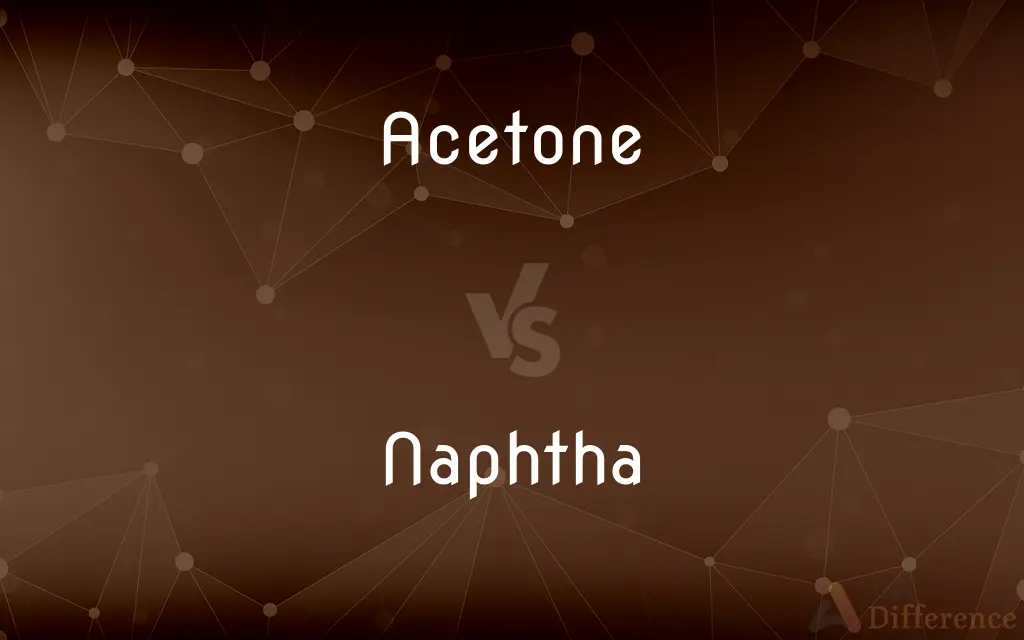Acetone vs. Naphtha — What's the Difference?
Edited by Tayyaba Rehman — By Urooj Arif — Updated on March 9, 2024
Acetone is a fast-evaporating solvent used in cleaning and thinning, while naphtha is heavier, slower to evaporate, and used in fuels and as a paint thinner.

Difference Between Acetone and Naphtha
Table of Contents
ADVERTISEMENT
Key Differences
Acetone is widely recognized for its rapid evaporation rate, making it ideal for applications requiring quick drying, like nail polish removal and electronics cleaning. On the other hand, naphtha evaporates more slowly, which can be beneficial in processes where a longer working time is needed, such as in certain types of paint thinners and varnishes.
While acetone is known for its strong solvent capabilities, effectively dissolving a wide range of chemical compounds, naphtha is often preferred for its ability to dissolve certain oils and waxes that acetone cannot, making it suitable for heavier duty cleaning tasks and industrial applications.
Acetone has a distinct, sharp smell that is easily recognizable, whereas naphtha has a more hydrocarbon-like odor, reminiscent of gasoline. This difference in smell reflects their chemical compositions and influences their preferred uses and handling precautions.
In terms of safety, acetone is generally considered less toxic and poses fewer health risks compared to naphtha. However, both solvents require careful handling, as they can irritate the skin and eyes and have harmful vapors.
Acetone's compatibility with plastics and synthetic fibers is limited, as it can dissolve or damage these materials. Naphtha, while also a strong solvent, is sometimes a safer choice for cleaning or thinning applications involving certain plastics and rubbers without causing damage.
ADVERTISEMENT
Comparison Chart
Evaporation Rate
Fast
Slow
Solvent Strength
High for chemicals and plastics
High for oils and waxes
Smell
Sharp, distinct
Hydrocarbon-like, similar to gasoline
Toxicity
Generally lower
Higher
Compatibility
Limited with plastics and synthetic fibers
Safer for some plastics and rubbers
Compare with Definitions
Acetone
A volatile, flammable liquid used as a solvent and in the synthesis of organic compounds.
Acetone is commonly used to remove nail polish.
Naphtha
A flammable hydrocarbon mixture used as a solvent and in fueling.
Naphtha is used in lighter fluid.
Acetone
Used in the pharmaceutical and cosmetic industries.
Acetone is used to purify and extract certain compounds.
Naphtha
Commonly used in the petrochemical industry as a feedstock.
Naphtha is processed in steam crackers to produce ethylene.
Acetone
A solvent capable of dissolving many plastic and synthetic fibers.
Acetone can damage plastic eyeglass frames.
Naphtha
Suitable for cleaning heavy oils and greases.
Naphtha is used for degreasing engine parts.
Acetone
A key ingredient in some paint thinners.
Acetone effectively thins acrylic paint.
Naphtha
A heavier alternative to acetone in paint thinners.
Naphtha slows drying time in varnishes.
Acetone
Features a rapid evaporation rate.
Acetone dries quickly when applied to surfaces.
Naphtha
Features a slower evaporation rate.
Naphtha remains on surfaces longer before evaporating.
Acetone
Acetone, or propanone, is an organic compound with the formula (CH3)2CO. It is the simplest and smallest ketone. It is a colourless, highly volatile and flammable liquid with a characteristic pungent odour.
Naphtha
Naphtha ( or ) is a flammable liquid hydrocarbon mixture. Mixtures labelled naphtha have been produced from natural gas condensates, petroleum distillates, and the distillation of coal tar and peat.
Acetone
A colorless, volatile, extremely flammable liquid ketone, C3H6O, widely used as an organic solvent. It is one of the ketone bodies that accumulate in the blood and urine when fat is being metabolized.
Naphtha
Any of several highly volatile, flammable liquid mixtures of hydrocarbons distilled from petroleum, coal tar, and natural gas and used as fuel, as solvents, and in making various chemicals. Also called benzine, ligroin, petroleum ether, white gasoline.
Acetone
(organic compound) A colourless, volatile, flammable liquid ketone, (CH3)2CO, used as a solvent.
Naphtha
(Obsolete) Petroleum.
Acetone
A volatile liquid consisting of three parts of carbon, six of hydrogen, and one of oxygen; pyroacetic spirit, - obtained by the distillation of certain acetates, or by the destructive distillation of citric acid, starch, sugar, or gum, with quicklime.
Naphtha
(dated) Naturally occurring liquid petroleum.
Acetone
The simplest ketone; a highly inflammable liquid widely used as an organic solvent and as material for making plastics
Naphtha
Any of a wide variety of aliphatic or aromatic liquid hydrocarbon mixtures distilled from petroleum or coal tar, especially as used in solvents or petrol.
Naphtha
The complex mixture of volatile, liquid, inflammable hydrocarbons, occurring naturally, and usually called crude petroleum, mineral oil, or rock oil.
Naphtha
One of several volatile inflammable liquids obtained by the distillation of certain carbonaceous materials and resembling the naphtha from petroleum; as, Boghead naphtha, from Boghead coal (obtained at Boghead, Scotland); crude naphtha, or light oil, from coal tar; wood naphtha, from wood, etc.
Naphtha
Any of various volatile flammable liquid hydrocarbon mixtures; used chiefly as solvents
Common Curiosities
Can naphtha dissolve plastics like acetone?
While naphtha can dissolve certain plastics, it is sometimes safer on plastics and rubbers compared to acetone.
Can either solvent be used for cleaning electronics?
Acetone, due to its rapid evaporation, is often preferred for cleaning electronics, but care must be taken not to damage sensitive components.
Is acetone more toxic than naphtha?
Acetone is generally considered less toxic than naphtha, though both require careful handling.
What are the main uses of acetone?
Acetone is primarily used as a solvent in the cosmetic industry, for cleaning, and in chemical synthesis.
What industries use acetone?
Acetone is widely used in pharmaceutical, cosmetic, and manufacturing industries.
Why is naphtha used in paint thinners?
Naphtha is used in paint thinners for its ability to dissolve oils and waxes, providing a desired slow drying time.
Why does naphtha have a gasoline-like smell?
Naphtha's hydrocarbon composition gives it a smell similar to gasoline.
Is acetone effective in removing super glue?
Yes, acetone can dissolve super glue and is often used for this purpose.
What are the environmental impacts of using acetone and naphtha?
Both solvents can contribute to air and water pollution if not disposed of properly.
Are acetone and naphtha flammable?
Yes, both solvents are highly flammable and must be handled with care.
What should I do if I accidentally inhale too much acetone or naphtha?
Move to an area with fresh air and seek medical advice if symptoms persist.
How do the evaporation rates of acetone and naphtha affect their uses?
Acetone's fast evaporation is suited for quick-drying applications, while naphtha's slower rate is beneficial for applications requiring a longer working time.
What safety precautions should be taken when using acetone or naphtha?
Proper ventilation, protective gloves, and eye protection should be used to minimize exposure to vapors and contact with skin.
Can I use naphtha as a fuel?
Naphtha can be used as a fuel, particularly in some industrial applications.
Can naphtha be used on all types of paint?
Naphtha is suitable for thinning oil-based paints but may not be compatible with all paint types.
Share Your Discovery

Previous Comparison
Prom vs. Soiree
Next Comparison
Sign vs. PlaqueAuthor Spotlight
Written by
Urooj ArifUrooj is a skilled content writer at Ask Difference, known for her exceptional ability to simplify complex topics into engaging and informative content. With a passion for research and a flair for clear, concise writing, she consistently delivers articles that resonate with our diverse audience.
Edited by
Tayyaba RehmanTayyaba Rehman is a distinguished writer, currently serving as a primary contributor to askdifference.com. As a researcher in semantics and etymology, Tayyaba's passion for the complexity of languages and their distinctions has found a perfect home on the platform. Tayyaba delves into the intricacies of language, distinguishing between commonly confused words and phrases, thereby providing clarity for readers worldwide.













































